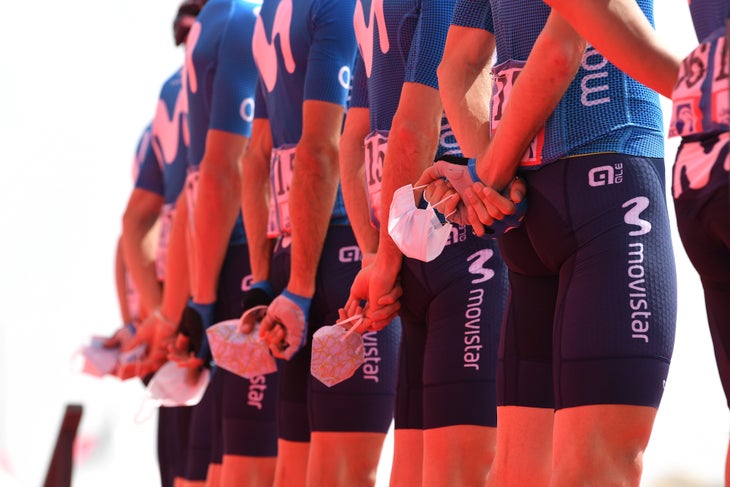In the second part of our series of the impacts of COVID-19, we look at the thorny issue of vaccines and why the peloton is cautiously optimistic about 2022.
Even though the 2021 racing season was better than the major disruptions witnessed last year, COVID-19 continues to rattle professional cycling despite infection rates plunging across the globe.
Races in China and the 2022 WorldTour openers in Australia were canceled, and teams and race organizers are looking ahead to 2022 with a mix of cautious optimism and trepidation.
Vaccines are seen by many within the peloton as the best and most effective way to put the coronavirus into a manageable box heading into 2022 and next year’s Tour de France.
So far, teams and cycling’s governing body are tip-toeing around the issue of vaccines. There’s disagreement if teams or even the UCI have the legal ground to force staffers and riders to receive vaccines.
“We don’t have a set policy on our team,” said Brent Copeland, general manager at Team BikeExchange, who confirmed one of their riders has chosen not to get vaccinated yet. “Everyone is waiting to see what the UCI comes up with. As a team, we believe in freedom of speech and everyone can make their own choices, but we will see if there is a vaccines protocol with the UCI. There’s a lot of legality behind that decision.”
Also read:
- Pandemic in the peloton: Will the sport ever be the same?
- Simon Geschke and his COVID prison
- Back from the brink: How cycling endured the pandemic
Teams and race organizers are hopeful professional cycling will see an easing of COVID-19 restrictions in 2022, but a few riders and staffers still refuse — or cannot get — vaccines, creating a rift inside the sport.
There do not appear to be many vaccine holdouts within the top echelons of the sport. Most top pros and staffers embraced the vaccines as a way to return to relative normality. Though teams did not impose vaccine requirements, it was largely encouraged across the peloton.
Just like the rest of the world, however, not everyone is crazy about the idea of a relatively new vaccine jabbed into their arm.
Sources confirmed to VeloNews that there are a handful of riders across the men’s and women’s pelotons who have refused, or who have not yet received vaccines.
Sometimes it’s an issue of access, with some African riders still unable to get vaccinated. For others, it’s a question of personal choice.
Right now, there is not a vaccine requirement or mandate across the peloton, but teams are encouraging everyone within their respective organizations to get a vaccine if they haven’t already.
Teams admit the question about imposing vaccines is a balancing act.
“The issue of vaccines should not be so controversial. Suddenly, now, everyone is a virologist? Billions of doses have been administered and it shows it’s highly effective,” said Israel Start-Up Nation owner Sylvan Adams. “I would have a problem if someone chooses to skip a camp. I would have a problem if we have unvaccinated people creating issues for us at bike races next year.”
The debate over vaccines might soon be a moot point, at least for professional riders. Governments and other major organizations are already moving on the issue. Vaccines are typically required for flights, so unless someone can move on the ground, vaccination is already a requirement for most international travel.
Israel Start-Up Nation, for example, is holding a team camp in Israel next week. The Israeli government requires anyone entering its borders to be vaccinated as well as show proof of a negative PCR test, so anyone on that team hoping to attend the camp will need to be jabbed.
Sources tell VeloNews that the UCI is uncertain if it has the legal standing to impose a vaccine requirement across the entire peloton, especially with riders and teams represented across the globe.
The UCI and its medical staff are working on updated health rules going into 2022, with the current “race bubble” concept, with pre-race health screenings and social distancing measures remaining intact until at least February.
The same larger questions and concerns that provoke debate and division across the globe have played out within professional cycling. Most are on board with vaccines, but there are a few who believe they should not be forced or coerced to be vaccinated.
What insiders say they want to avoid is seeing a few vaccine hold-outs imperiling possible rollbacks of mitigation efforts and the easing of expensive and time-consuming pre-race health screenings going into 2022.

Is the COVID-19 genie back in the bottle?
Has the peloton turned the corner on COVID-19? That all depends on where a team, event, or racer might be located.
In Europe, where vaccine rates have climbed above 85 percent in many countries, hospitalization and death rates have plummeted. Race calendars unfolded largely unaffected in 2021 across most of the major races. There were a few exceptions; Paris-Roubaix, for example, was postponed until October along with a handful of other races.
In other parts of the world, however, COVID is still very much an issue.
Australia only recently lifted its most severe restrictions, and both the 2022 Santos Tour Down Under and the Cadel Evans Great Ocean Road Race were canceled for the second consecutive year. WorldTour events in China were also canceled for the second year running. Vaccination rates lag in the Americas, Africa, and much of Asia, and races and teams there are facing the consequences.
In contrast, the UAE Tour — which was among one of the first races to be impacted in the earliest days of the pandemic in February 2020 — has already confirmed its dates for 2022. That means the Arab race will open the UCI men’s WorldTour for the second year in a row.
“I have said it from the beginning, it’s something we have to learn to live with,” said Jumbo-Visma general manager Plugge of COVID-19. “We have to let life go on as normal as possible, but with this virus in mind.”
Plugge knows full well the impacts of the disease. The Dutch general manager fell ill with the coronavirus early in the pandemic and was hospitalized for several days. After seeing his team through two challenging seasons racing under pandemic conditions, he’s bullish that things will only improve as vaccination rates grow.
“We have to find a way that we can operate with COVID,” Plugge said. “The world is learning every day how it works and how we can be safer. The adaption of new rules will eventually happen. The most important thing is that everything is slowly improving.”
There is room for optimism that cycling can return to its roots of being a sport without a stadium, and one where fans can get up and close and personal with their cycling heroes.
In September, the world championships were contested after a recent easing of masking and social distancing requirements across Flanders, and an estimated 1 million fans poured out to watch the elite men’s road race in what was a coming-out party of sorts for Belgium after nearly 18 months of drama.
Is that familiar face of cycling the sport’s future? Or will masking, social distancing, and other health mitigation efforts become a permanent part of cycling? The 2022 season could prove decisive.
